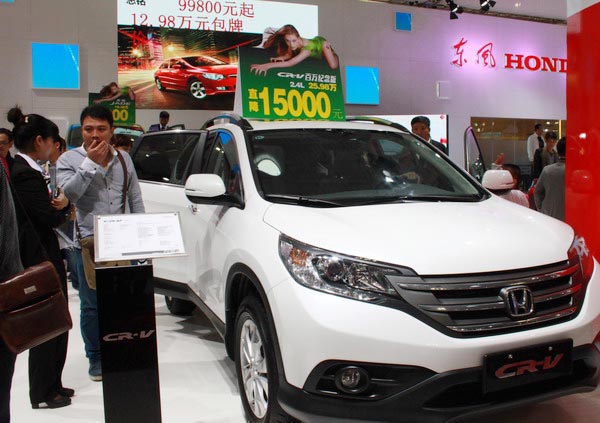|
 Visitors check a Honda CR-V at an auto show in Haikou, Hainan province. Honda Motor Co said its March sales in China dipped 2 percent to about 60,000 vehicles. Shi Yan / For China Daily |
Conditions have improved in China for Japanese vehicle producers, which saw their sales slump amid the Diaoyu Islands dispute in 2012. But the Japanese companies are still facing tough challenges in regaining market share.
Honda Motor Co said its March sales in China dipped 2 percent year-on-year to about 60,000 vehicles, following a 31 percent surge in the first two months. The company attributed the decline to delays involving two upgraded models produced by its joint venture with Guangzhou Automobile Group Co Ltd, which itself reported a sales drop of 13 percent in March.
|
|
|
|
The company aims to deliver 900,000 Honda vehicles in China this year, which would be up 19 percent from last year.
Nissan Motor Co Ltd's sales accelerated 26 percent year-on-year in March, compared with 18 percent in the first two months. Sales were supported by the launch of an upgraded sport utility vehicle, the fastest-growing sector in China.
The leading Japanese automaker, Toyota Motor Corp, said on Tuesday that sales in March jumped 19.1 percent year-on-year to 90,400 vehicles. First-quarter sales surged 23.4 percent. Toyota's sales have increased year-on-year for seven consecutive months.
Toyota has set a sales target of 1.1 million vehicles, including its premium-branded Lexus, in China this year. That would represent growth of 19.9 percent. But generally, Toyota is losing ground to other foreign vehicle makers in China, the world's largest auto market.
Last year, Toyota didn't even make the top five in sales.
According to the China Association of Automobile Manufacturers, Japanese vehicle producers' combined market share increased to 13.4 percent in February from 11.9 percent a year earlier. Germany-based companies had a 23.4 percent share.
Japanese automakers' sales in China took a hit in September 2012, as the dispute over Japan's illegal "purchase" of China's Diaoyu Islands in the East China Sea kept local consumers away from Japanese companies' showrooms. Although things have picked up for Japanese vehicle producers since the second half of 2013, analysts said the situation remains fragile, because the political situation is still unsettled.
Cui Dongshu, deputy secretary-general of the China Passenger Car Association, said that even without political factors, Japanese vehicle companies would be losing market share in China to US and German rivals.
The Japanese companies "lack strategic product offerings in entry-level sectors as well as in lower-tier cities in central and western parts of China," said Cui.
?
